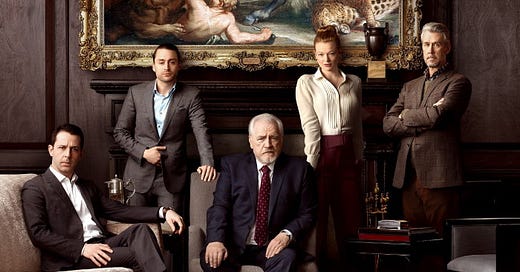SUCCESSION: What strange beast of the global entertainment industry is this?
bonus 045 - 27th September, 2020
It was however many days/months/years? into the Great Melbourne COVID-19 lockdown of 2020, when every day felt identical, just with different weather, and there was naught to do each night but stream TV shows and movies. But fresh content has slowed to a trickle to the extent that (as I can only imagine, as TV has trained me to), like someone fresh out of prison, entertainment media that once held no appeal had suddenly become enticing. Such was the case for me with the TV show Succession – given a new gloss in my mind upon learning to my surprise, nay shock, during an appearance on Chapo Traphouse, one of America's 'dirtbag left' podcasts, that Adam McKay (The Big Short) was not only a producer of the show, alongside Will Ferrell, but also directed its pilot.

And so it came to be this world-weary reviewer, who's filled the pages of newspapers, magazines and websites with his various pop-cultural dissections, stood at the base of a mountainous two seasons of critically-acclaimed, award-winning prestige drama, wondering just what awaited him in the sole piece of #resistancetv that seemed hospitable to him – the only one he had the fortitude to brave. The Handmaid's Tale adaptation being about as appealing as free-climbing an ice wall without so much as crampons on my boots. Maybe Ötzi the Iceman would have had the fortitude to get more than ten minutes into Miss America before begging for the sweet embrace of the crevasse, but this reviewer would've happily rappelled into the abyss. So Succession it would be, and probably Succession alone. Whatever awaited there nonetheless piqued my curiosity.
Would it be suffused with the same Dad Energy of Billions, the series it seemed most similar to upon initial reconnaissance? Would this too become a hate-watch of an overly-written, highly produced “victory lap for neoliberal hypercapitalism,” as a friend put it over a chat session, as I steeled myself to scale this outcropping of the global entertainment industry whose control it was orientated around?
In the end, I felt almost nothing for the show or its characters, nothing other than a nagging puzzlement at its very existence that could only be explored by continuing to press on in the hope of mentally unpacking that feeling – watching each episode with the same bewilderment that the first English naturalists to happen upon a platypus in the Australian wilderness must have felt. What strange beast was this? It possessed attributes of other pieces of entertainment I'd encountered, but in a combination hitherto unseen to my eyes.
That it might be a piece of darkly comedic satire was my initial, and perhaps only, favourable assessment. But unlike the searingly resonant critiques of power that is the work of Armando Iannucci (The Thick of It, Veep) – his most recent series Avenue 5 feeling particularly resonant to this moment, as the rich flee the collapse as best they can – this was satire played so straight as to be almost indistinguishable from pure drama.
In the twenty episodes of Succession I subjected myself to – like some US Senator bent on proving that waterboarding isn't torture – I laughed-out-loud precisely once: during the scene where our heroic young Randian, Kendall Roy – would-be successor to the Iron Throne of the thinly-veiled Murdoch media empire – kept demanding his cousin, Greg-call-me-Gregory, procure him ketamine in the midst of an exclusive, one-percenter party that could only have benefited by Patrick Bateman giving it his personal touch, but sadly didn't.
Of the entire cast, only Kieran Culkin seemed to be authentically portraying the life of a failson, and it took nearly two seasons for it to do something meaningful with his character; shining a light on just how cozy corporate America is with the sovereign wealth funds of the Middle East – and the price in blood that comes with that.
Not even the excellent Sarah Snook (Predestination) – whose casting was all the show previously had to recommend it prior to Adam McKay's interview – could make me tune in, lest I repeat the experience of losing all love for Cate Blanchett's work by merely attempting to watch Miss America. But I persevered.
Ultimately, ascent complete, the revelation that awaited me on the mountain top couldn't have been simpler: there's nothing Elite about these people at all. They're just as preoccupied with holding on to what they've got as the next person, and they have so much more to lose. If the design all along was to feel no sympathy at all for these characters, it succeeded in its mission. If you'd ever wondered why Steve Jobs was more interested in his company’s share price than his own health, that's implicitly answered by the show. And that is more empowering than inheriting a quarter of a billion dollars.



